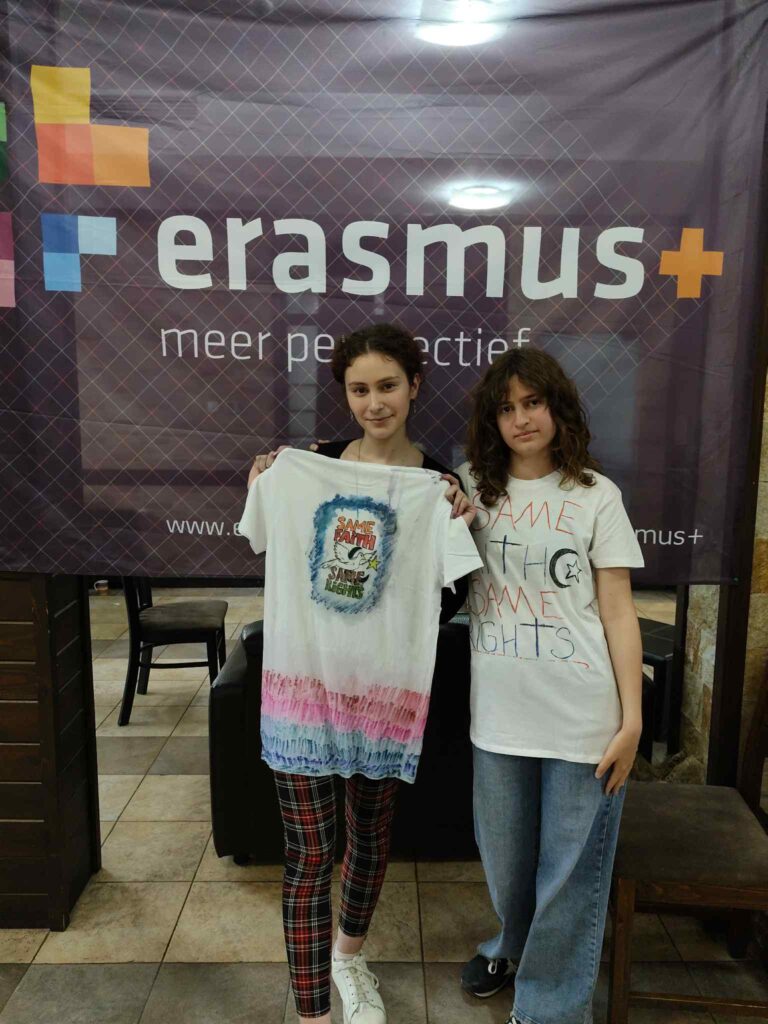
My motivation for going into this Erasmus+Hate Free Europe youthExchange project was first to go along with my friend Andreea becouse she was the only girl în our romanian team but then I wanted to challenge myself to something new and see what its like to be part of such a big group of people.My expectations was not so high only becouse of the main subject that is Islamophobia(I was taught to avoid and criticize them)but now my mind changed to a certain degree and I am satisfied with my experience.
The activity when each team presented islamophobia în their country made me think about what a problematic and terrible thing this discrimination against religious people is and it made me also want to know and try to understand somone different before judging them just becouse of the propaganda and rumors that I heard.
The art was my favorite part of this program becouse În this method,we develop our artistic side,our creativity and also different styles.I can say that the artistic activities made me express myself clearly and see the harsh truth of islamophobia and how damiging it is to people.
I learned that not all muslim people are terrorist with bombs like the media tryes to portray them.The project for sure made me want to stop judging people of other religion than mine and try to be more mindfull.
I would try to tell them to still love and respect the MUSLIM PEOPLE even though they don’t respect their RELIGION(în wich I agree)
C.P
Romanian participant
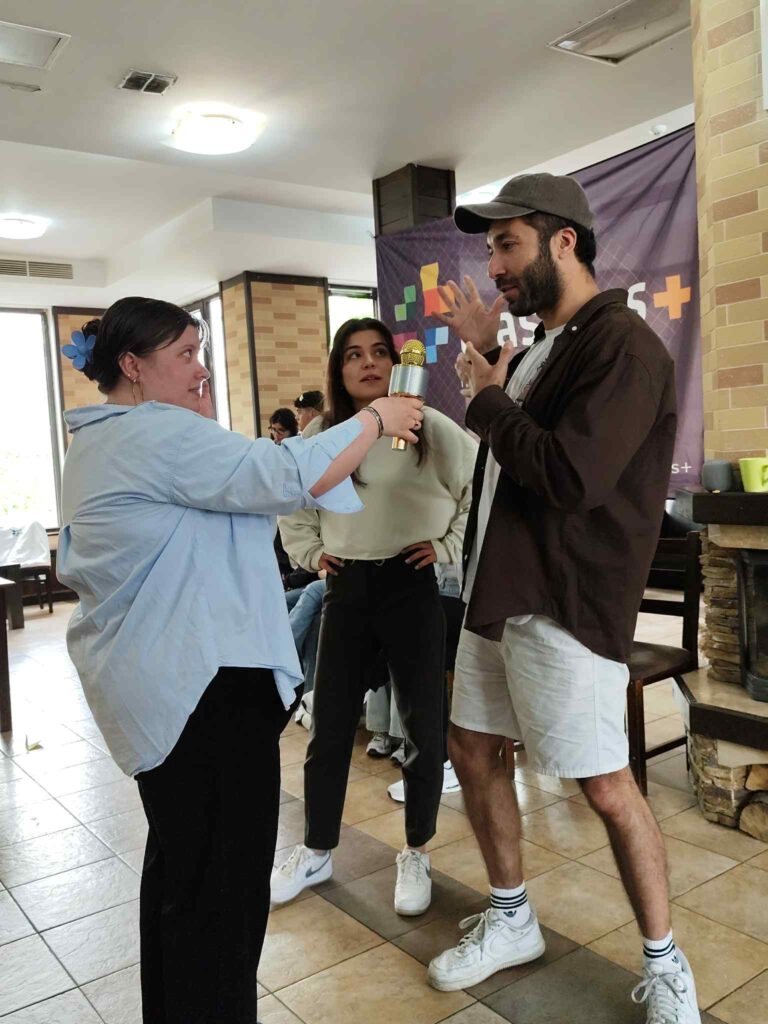
Motivation and Expectations
I joined this youth exchange to engage with people from diverse backgrounds and learn more about different cultures and religions. My expectations were exceeded—the participants’ knowledge and respectful attitudes, despite their differences, were inspiring. It was enriching to witness such openness and understanding.
Challenging Moments and Personal Growth
A powerful moment for me was a group discussion on stereotypes. Hearing real stories of discrimination made me reflect deeply on my own assumptions. This experience helped me grow by encouraging empathy and a more open-minded perspective.
Artistic Expression and Inclusion
Artistic activities like painting, graffiti, and collaborative projects allowed me to express my thoughts on Islamophobia and inclusion creatively. These moments helped build unity and understanding beyond language.
Learning about Islamophobia
Before the exchange, I had a limited view of Islamophobia. I learned how it manifests in both subtle and overt ways, and how media plays a vital role in shaping public opinion—even when presenting facts. Hate speech often stems from opinions influenced by mass media narratives. This awareness has made me more committed to standing against discrimination and promoting inclusivity.
Interactive Learning and Dialogue
Games such as debates and role-playing different social classes helped us understand how society classifies people and the pillars that define our lives. Discussions between Muslim and Christian participants brought clarity and answered many questions, showing the power of open dialogue.
Cultural Visits and Community Insight
A visit to the mosque and the imam’s speech, along with his thoughtful answers to our questions, helped us understand how diverse and peaceful Bulgarian communities are. It was a meaningful experience that highlighted the value of interfaith understanding and coexistence.
Message to Peers and Community
My message is simple: seek dialogue. Cultural exchange and honest conversations can break down barriers and build a more inclusive society. Approach these opportunities with curiosity and an open heart.
E.A
Dutch participant
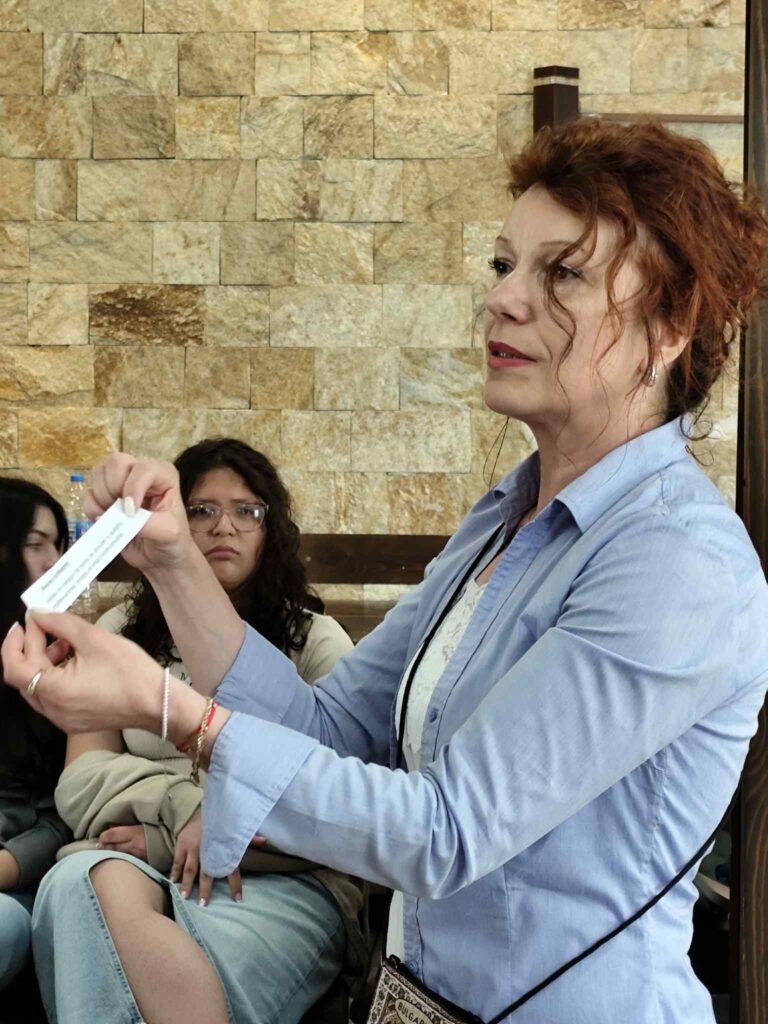
What motivated you to join this youth exchange, and how did your expectations compare to the actual experience?
I was motivated to join the project by my team’s willing of finding out more about the topic of Islamophobia, and as a team leader to support and encourage my students to discover the Erasmus+ amazing world. As for all of them it was their first experience, I hope and wish they may have many similar ones in future.
Can you share a moment or activity during the exchange that changed your perspective or helped you grow personally?
The moments I can think of are the stories I heard about the Muslims not only being discriminated, but suffering injuries or being killed as a consequence of Islamophobic people.
How did the artistic activities help you express your thoughts or feelings about Islamophobia and inclusion?
I think that the artistic activities in general and the ones carried out during this project in particular give the young people the freedom of expressing their opinions and message on the topic in discussion in other ways different from a public speech or debate, taking into account that the more a message is sent the better it can be heard.
What did you learn about Islamophobia that you didn’t know before, and how will this change your actions or attitudes in the future?
The things I learnt about Islamophobia and I didn’t know before are the impact of misconception and prejudice that some people have about Islam and the amount of fake-news in Media.
If you could share one message with your peers or community about this experience, what would it be?
My message I want to share with my students about this experience is that inclusion, tolerance and acceptance are essential for a peaceful life in a world they are creating for themselves and for the next generations.
C.D
Romanian participant
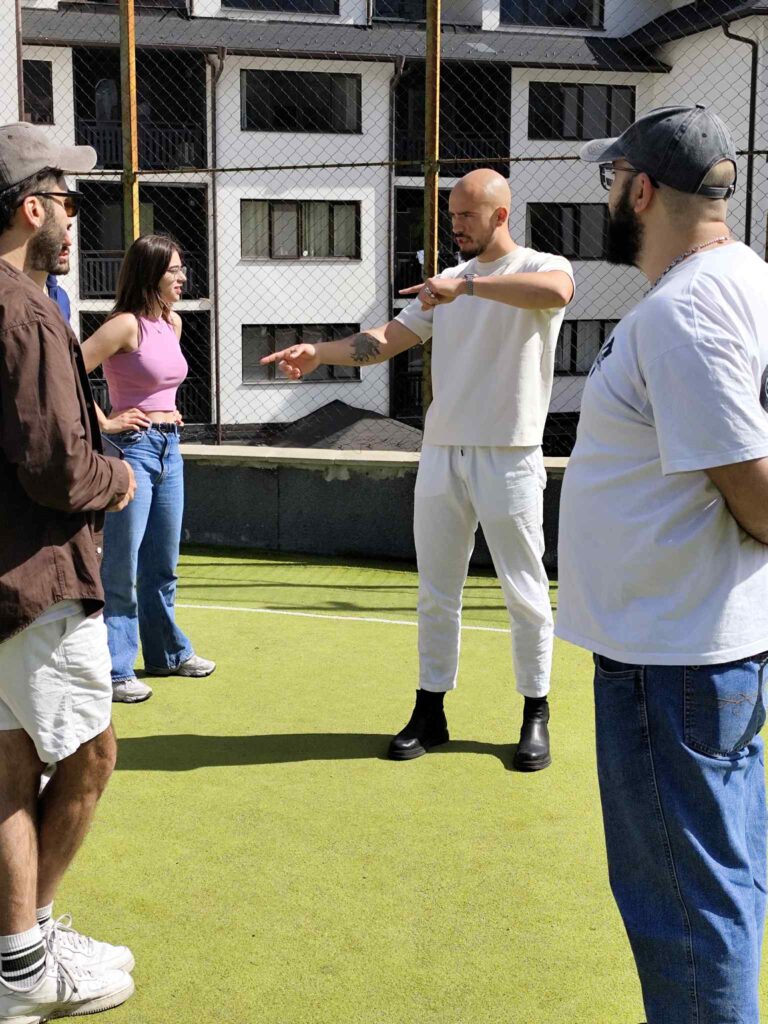
What initially motivated me to join this youth exchange was a strong desire to deepen my sense of European identity and to explore important social issues in a multicultural environment. I was particularly interested in learning more about Islamophobia and hate speech — topics that are increasingly relevant today. I expected to meet new people, exchange perspectives, and learn in an informal but meaningful setting. The reality of the experience far exceeded my expectations. Not only did I gain knowledge, but I also formed deep connections and found a space where dialogue, respect, and creativity thrived.
One moment that challenged me personally was the activity “One Step Forward.” In this social simulation, we were each given a character to play, and had to step forward or stay behind depending on how our character would be treated in society. It was a powerful experience that made me reflect on privilege, discrimination, and the silent barriers people face every day. Another challenging moment was the “fishbowl” debate. The topic was highly sensitive and complex, and it became clear that addressing such issues requires not only empathy but also a solid base of knowledge. It was difficult, but it pushed me to listen more attentively, think more critically, and speak more responsibly.
Artistic activities were a central part of the program, and they really helped me express thoughts and feelings that are sometimes hard to put into words. In my country, we say that “a picture is worth a thousand words,” and I truly believe that. Art gave me a voice when words felt too limited. Whether through theatre, drawing, or performance, these creative methods allowed us to connect on an emotional level and communicate the pain, hope, and strength behind the issues we were exploring.
One of the biggest lessons I learned during the exchange was the incredible influence of media on our perception of Islam and Muslims. I was surprised to realize how deep and subtle that influence can be. It made me much more critical of the information I consume, and I now feel a greater responsibility to verify my sources and stay informed through diverse, trustworthy perspectives.
If I could share one message with my peers or community, it would be this: participating in a project like this is not just an opportunity to travel or meet new people — it’s a life-changing experience. It opens your eyes, challenges your assumptions, and reminds you of the importance of understanding and inclusion in a world that often moves too fast to notice what truly matters.
K.M
Italian participant
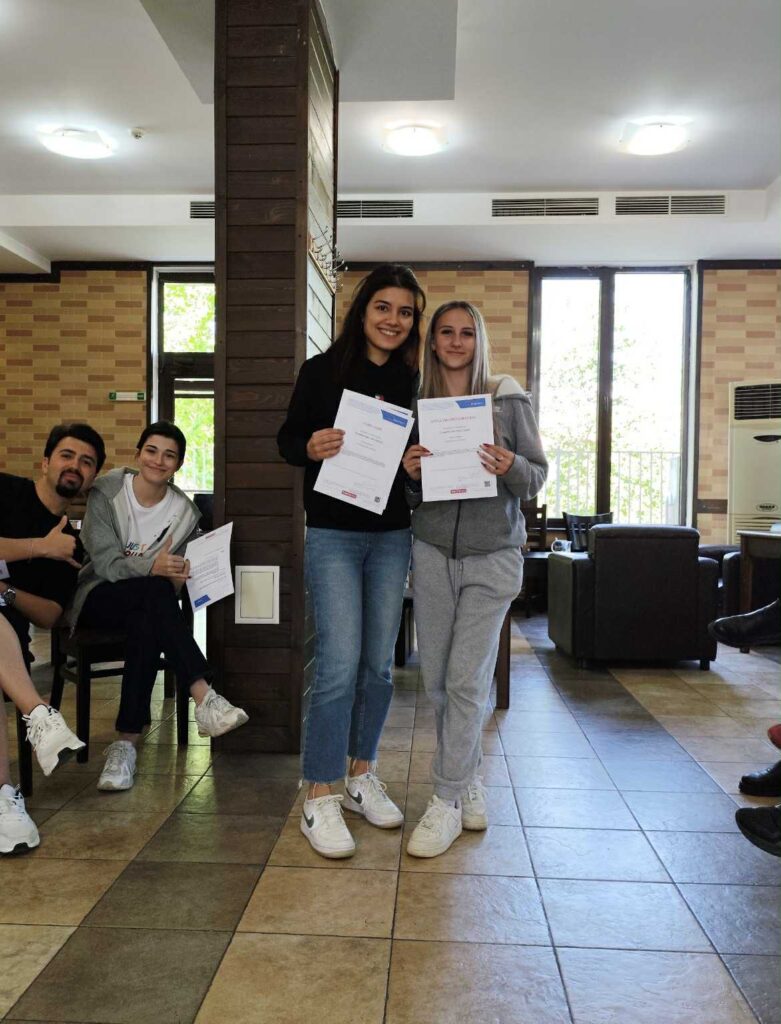
What motivated you to join this youth exchange, and how did your expectations compare to the actual experience?
I was really interested in joining this youth exchange because the topic of Islamophobia is something I wanted to learn more about. I’ve always wanted to participate in an Erasmus+ project, and this seemed like a meaningful opportunity to connect with others while exploring an important issue. I expected to meet new people and learn something valuable, but honestly, the experience was even more enriching than I imagined. The conversations, the atmosphere, and the openness of everyone made it truly special.
Can you share a moment or activity during the exchange that challenged your perspective or helped you grow personally?
The most Impactful moment for me was our visit to the mosque. It really challenged some of the assumptions I had and gave me a better understanding of the Islamic faith and community. Seeing the mosque from the inside, listening to the explanations, and experiencing the hospitality made me reflect deeply on how much we often misunderstand each other due to stereotypes or lack of information.
How did the artistic activities help you express your thoughts or feelings about Islamophobia and inclusion?
While the artistic activities weren’t the main way I personally expressed myself, I still appreciated how they created a space for reflection and creativity. Even though I didn’t feel a strong emotional connection through art, I saw how others used it to share powerful messages, and that was inspiring in itself.
What did you learn about Islamophobia that you didn’t know before, and how will this change your actions or attitudes in the future?
Before this exchange, I wasn’t fully aware of how deep and subtle Islamophobia can be. I used to think it was just about open hatred or extreme cases, but through our discussions, I realized that it can also show up in everyday situations—in the way people speak, joke, or assume things. I learned that many stereotypes we hear are simply not true. Moving forward, I will try to be more active in challenging those ideas and promoting understanding in my community.
If you could share one message with your peers or community about this experience, what would it be?
My message would be: be more respectful, tolerant, and open-minded. It’s easy to judge what we don’t understand, but once we take the time to listen, learn, and connect, everything changes. This exchange showed me that empathy and curiosity can break down barriers and build real connections.
E.B
Bulgarian participant
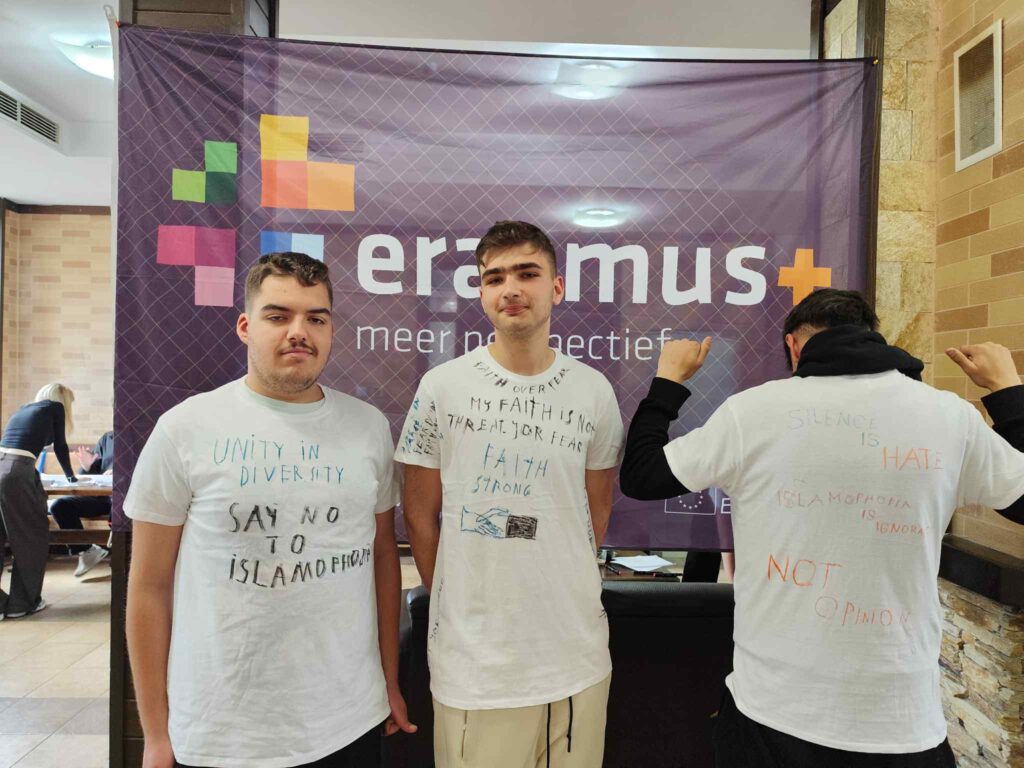
What motivated you to join this youth exchange, and how did your expectations compare to the actual experience?
I joined this youth exchange because I wanted to better understand different cultures and to explore the topic of Islamophobia, which I believe is a serious issue in today’s society. I expected to attend workshops and discussions, but I was pleasantly surprised by how engaging and interactive everything was. The experience exceeded my expectations, especially in how deeply we connected as a group and how safe the environment felt to share our ideas and emotions.
Can you share a moment or activity during the exchange that challenged your perspective or helped you grow personally?
One activity that really challenged my perspective was a group discussion where participants shared personal stories about discrimination. Hearing firsthand experiences opened my eyes to the impact of stereotypes and prejudice. It helped me grow personally by encouraging empathy and making me more aware of how important it is to stand against hate and ignorance.
How did the artistic activities help you express your thoughts or feelings about Islamophobia and inclusion?
The artistic activities, especially the collaborative mural and spoken word sessions, allowed me to express my thoughts in a creative and emotional way. I could show how Islamophobia affects people’s lives and promote inclusion through images and words. These activities broke down language barriers and helped us connect deeply, even when words failed.
What did you learn about Islamophobia that you didn’t know before, and how will this change your actions or attitudes in the future?
I learned that Islamophobia often goes unnoticed or unchallenged in everyday life, and that it can be subtle but still harmful. I also learned about the historical roots and how media often reinforces negative stereotypes. In the future, I will be more proactive in calling out discrimination, educating others, and supporting inclusive initiatives in my school and community.
If you could share one message with your peers or community about this experience, what would it be?
My message would be: “Understanding begins with listening. Take the time to hear people’s stories, learn from them, and always choose empathy over fear. We all have the power to create a more inclusive and respectful world.”